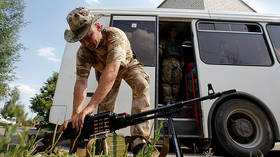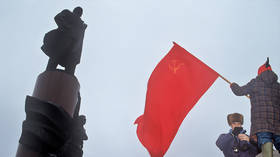Peace in Ukraine? The friends and foes of a Kiev-Moscow settlement (By Stephen Cohen)

Ukraine, as I have often emphasized, is the epicenter of the new US-Russian Cold War, and its location directly on Russia’s border makes it much more dangerous than was Berlin during the preceding 40-year confrontation.
Some 13,000 people have reportedly already died in Donbass in fighting between forces backed by Washington and Moscow. For many on both sides of the border, the war is a personal tragedy due also to the at least tens of millions of inter-married Ukrainian-Russian families. (The names of some of them will be familiar to readers, such as Khrushchev and Gorbachev.)
The election of Ukraine’s new president, Volodymyr Zelensky, who won decisively throughout most of the country, represents the possibility of peace with Russia, if it—and he—are given a chance. His electorally repudiated predecessor, Petro Poroshenko, backed by supporters in Washington, thwarted almost every preceding opportunity for negotiations both with the Donbass rebels and with Moscow, notably provisions associated with the European-sponsored Minsk Accords. Zelensky, on the other hand, has made peace (along with corruption) his top priority and indeed spoke directly with Russian President Vladimir Putin, on July 11. The nearly six-year war having become a political, diplomatic, and financial drain on his leadership, Putin welcomed the overture.
Also on rt.com Putin discusses Ukrainian conflict, prisoner exchange, in first direct phone call with ZelenskyBut the struggle for peace has just begun, with powerful forces arrayed against it in Ukraine, Moscow, and Washington. In Ukraine, well-armed ultra-nationalist—some would say quasi-fascist—detachments are terrorizing supporters of Zelensky’s initiative, including a Kiev television station that proposed broadcasting a dialogue between Russian and Ukrainian citizens. (Washington has previously had some shameful episodes of collusion with these Ukrainian neo-Nazis.) As for Putin, who does not fully control the Donbass rebels or its leaders, he “can never be seen at home,” as I pointed out more than two years ago, “as ‘selling out’ Russia’s ‘brethren’ anywhere in southeast Ukraine.” Indeed, his own implacable nationalists have made this a litmus test of his leadership.
READ MORE: ‘Russians and Ukrainians are one people,’ Putin tells Oliver Stone
Which brings us to Washington and in particular to President Donald Trump and his would-be opponent in 2020, former Vice President Joseph Biden. Kiev’s government, thus now Zelensky, is heavily dependent on billions of dollars of aid from the International Monetary Fund, which Washington largely controls. Former president Barack Obama and Biden, his “point man” for Ukraine, used this financial leverage to exercise semi-colonial influence over Poroshenko, generally making things worse, including the incipient Ukrainian civil war. Their hope was, of course, to sever Ukraine’s centuries-long ties to Russia and even bring it eventually into the US-led NATO sphere of influence.
Also on rt.com ‘We have nothing to quarrel about’: Russians & Ukrainians speak for unity at televised conferenceOur hope should be that Trump breaks with that long-standing bipartisan policy, as he did with policy toward North Korea, and puts America squarely on the side of peace in Ukraine. (For now, Zelensky has set aside Moscow’s professed irreversible “reunification” with Crimea, as should Washington.) A new US policy must include recognition, previously lacking, that the citizens of war-ravaged Donbass are not primarily “Putin’s stooges” but people with their own legitimate interests and preferences, even if they favor Russia. Here too Zelensky is embarking on a new course. Poroshenko waged an “anti-terrorist” war against Donbass: the new president is reaching out to its citizens even though most of them were unable to vote in the election.
Biden, however, has a special problem—and obligation. As an implementer, and presumably architect, of Obama’s disastrous policy in Ukraine, and currently the leading candidate for the Democratic presidential nomination, Biden should be asked about his past and present thinking regarding Ukraine. The much-ballyhooed ongoing “debates” are an opportunity to ask the question—and of other candidates as well. Presidential debates are supposed to elicit and clarify the views of candidates on domestic and foreign policy. And among the latter, few, if any, are more important than Ukraine, which remains the epicenter of this new and more dangerous Cold War.
By Stephen F. Cohen
This article was originally published by The Nation.
Stephen F. Cohen is a professor emeritus of Russian studies, history, and politics at New York University and Princeton University. A Nation contributing editor, he is the author, most recently, of War With Russia? From Putin & Ukraine to Trump & Russiagate and Soviet Fates and Lost Alternatives: From Stalinism to the New Cold War.
Think your friends would be interested? Share this story!
The statements, views and opinions expressed in this column are solely those of the author and do not necessarily represent those of RT.













